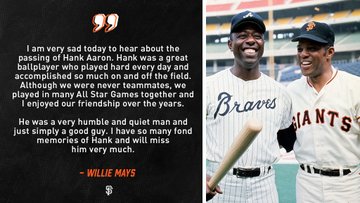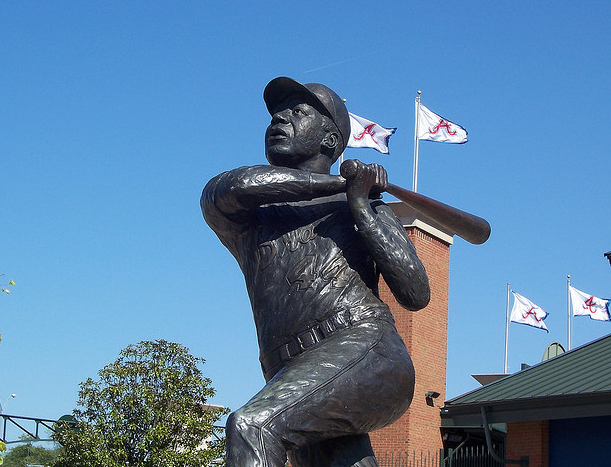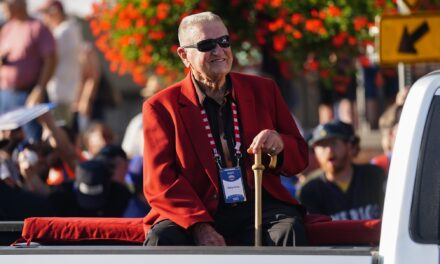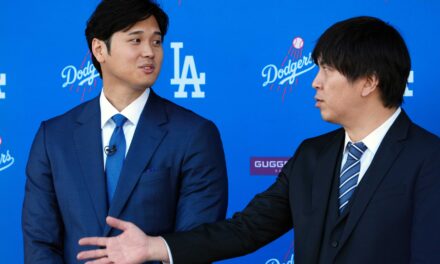
“Through his long career, Hank Aaron has been a model of humility, dignity, and quiet competence. He did not seek the adoration that is accorded to other national athletic heroes, yet he has now earned it.” – Andrew Young
Henry Aaron passed away peacefully in his sleep at age 86 on Friday. Known almost as much for his modesty, humility and grace as his propensity for the long ball, Aaron leaves behind a legacy in baseball few if any in the history of our national pastime can match. Through 23 seasons with the Milwaukee Braves, Atlanta Braves and Milwaukee Brewers, Aaron fashioned a career that at times was plagued by bigotry and life-threatening threats as he chased the most cherished record in sports — Babe Ruth‘s 714 career home runs.
Seven years after Jackie Robinson broke the color barrier in baseball, Aaron made his major league debut in 1954. He didn’t have the appearance of a power hitter as he weighed only 180 pounds. But he was speedy on the bases and strong with powerful and quick wrists.
“He had great forearms and wrists,” Lew Burdette, the outstanding Braves pitcher, recalled. “He could be fooled completely and be way out on his front foot, and the bat would still be back, and he’d just roll his wrists and hit the ball out of the ballpark.”
As for Aaron’s speed:
“There aren’t five men faster in baseball, and no better base runner,” Bobby Bragan, Aaron’s manager in the mid-1960s, told Sports Illustrated. “If you need a base, he’ll steal it quietly. If you need a shoestring catch, he’ll make it, and his hat won’t fly off and he won’t fall on his butt. He does it like DiMaggio.”
His approach to batting was to focus where the pitcher’s release point was and make appropriate changes. Dusty Baker, who was mentored by Aaron, once remarked:
“Nobody had concentration like he did, sitting there in the dugout, looking at the pitcher through the little hole in his cap to focus on the release point,” Baker once said. “Never saw anyone do that before Hank.”
That speed, strength and baseball smarts led to numbers, statistics and achievements that still reign in the pantheon of greatest ever. He played in a record 25 All-Star games (there were two All-Star games per year from 1959-1962). He was the NL MVP in 1957. Aaron also won three Gold Gloves and two batting titles while leading the league in home runs four times, RBI four times, runs three times, hits twice, doubles four times, slugging four times and OPS three times. He won the World Series with the 1957 Braves and was inducted into the Hall of Fame in his first try in 1982.

In his career, Aaron hit .305/.374/.555 (155 OPS+) with 624 doubles, 755 home runs, 2,297 RBI, 2,174 runs, 3,771 hits and 240 stolen bases. Among position players, Aaron ranks fifth in career WAR behind Barry Bonds, Ruth, Willie Mays and Ty Cobb. He’s one of just three players with at least 2,000 runs and 2,000 RBI (Babe Ruth and Alex Rodriguez).
Aaron still holds the record major league record for RBI, extra-base hits and total bases. In fact, his 6856 total bases is 722 ahead of Stan Musial who is a distant second in that category.
But unlike many power hitters, Aaron was selective at the plate. He averaged only 63 strikeouts per season and retired with a career .305 batting average.
His accomplishments were noticed by many — even presidents.
“He never missed an opportunity to lead.” – Barack Obama
“A breaker of records and racial barriers, his remarkable legacy will continue to inspire countless athletes and admirers for generations to come.” – Jimmy Carter
“The former Home Run King wasn’t handed his throne, “He grew up poor and faced racism as he worked to become one of the greatest baseball players of all time. Hank never let the hatred he faced consume him.” – George Bush
“With courage and dignity, he eclipsed the most hallowed record in sports while absorbing vengeance that would have broken most people.But he was unbreakable.” – Joseph Biden
Unfortunately, as he was paving a career that was legendary, he was faced with a few bumps along the way. The biggest was racism, and what Aaron endured would have derailed lesser persons, but Hank persevered. As his career home run total grew towards the hallowed mark of 714, so did the number of death threats. Aaron lamented:
“It’s very offensive,” he once said. “They call me (the N word) and every other bad word you can come up with. You can’t ignore them. They are here. But this is just the way things are for Black people in America. It’s something you battle all of your life.”
He later told William C. Rhoden of the N.Y. Times:
“It really made me see for the first time a clear picture of what this country is about. My kids had to live like they were in prison because of kidnap threats, and I had to live like a pig in a slaughter camp. I had to duck. I had to go out the back door of the ball parks. I had to have a police escort with me all the time. I was getting threatening letters every single day. All of these things have put a bad taste in my mouth, and it won’t go away. They carved a piece of my heart away.”
Aaron hit his 713th home run at the end of the 1973 season. The offseason was filled with anticipation by fans around the world. It was also filled with over 900,00 letters to Aaron many of which were threats to his life. The FBI took notice as did the Atlanta police who placed two off-duty patrolmen in the stands above right field in Atlanta- Fulton County Stadium.
Number 714 was delivered in Cincinnati. Then, on April 8, 1974 while the Braves were at home, Aaron stroked number 715, a towering, 400-foot shot over Dodger left fielder Bill Buckner‘s head and into the Braves’ bullpen. It came in the fourth inning on a 1-0 pitch in front of a crowd of 53,775. A light rain was falling. Al Downing threw the fateful pitch.
Vin Scully, who called the milestone, said:
“What a marvelous moment for baseball. What a marvelous moment for Atlanta and the state of Georgia. What a marvelous moment for the country and the world. A Black man is getting a standing ovation in the Deep South for breaking a record of an all-time baseball idol.”
Interestingly, or perhaps sadly, Commissioner Bowie Kuhn, was not in attendance. Kuhn also failed to immediately acknowledge Aaron’s 3000th hit the season before. Kuhn received his fair share of criticism for these ‘oversights’.
“Really, I’m not as in awe of the moment as I used to be. It’s to the point where I look back and I think to myself that I played the game the way that I wanted to play it for 23 years. Instead of 755 home runs, I could have ended up with 775 or more, if I would have really pushed myself during the end of my career.” – Henry Aaron
One quotation from Aaron put things in perspective for the home run king:
“Yeah, I did hit a lot of home runs, but I never struck out 100 times in a season. That’s the thing that I marvel at more than anything I did in the game.” After a near life-long pursuit of number 715, Aaron was most impressed by his plate discipline. Never a pompous man, Aaron was often lauded for his temperament, professionalism and his happy aura.
“I’ve always loved the guy,” said Dusty Baker, an Aaron teammate for eight years long before he became a three-time National League manager of the year. “He’d cut those eyes at you, and you knew you had to straighten up and stop doing wrong. He was always full of honor and dignity.”
Phil Niekro, who played with Aaron for 11 years noted: “I never saw him angry, I never even saw the man get upset. I’m sure it had to have happened, but if he ever was angry, he kept it to himself.”
Reaction to the death of Aaron was swift. Braves chairman Terry McGuirk released the following statement:
“We are absolutely devastated by the passing of our beloved Hank. He was a beacon for our organization first as a player, then with player development, and always with our community efforts. His incredible talent and resolve helped him achieve the highest accomplishments, yet he never lost his humble nature. Henry Louis Aaron wasn’t just our icon, but one across Major League Baseball and around the world. His success on the diamond was matched only by his business accomplishments off the field and capped by his extraordinary philanthropic efforts.
“We are heartbroken and thinking of his wife Billye and their children Gaile, Hank, Jr., Lary, Dorinda and Ceci and his grandchildren.”
Aaron becomes the 10th Hall of Famer to die since the start of 2020, joining Lou Brock, Bob Gibson, Al Kaline, Tom Seaver, Whitey Ford, Joe Morgan, Niekro, Tommy Lasorda and Don Sutton. To many casual fans, and from many who hail from the southern United States, Aaron’s death will be particularly painful.
Hank, in many ways, was Atlanta’s first professional sports star and a hero to many. He was soft-spoken, but influential in his fight against racial injustice. His demeanor and style went beyond the boundaries of the south and spread world wide.
Baseball great Willie Mays summed things up nicely:

Just 2 1/2 weeks before his death, Aaron joined civil rights icons to receive the COVID-19 vaccine. He wanted to spread the word to the Black community that the shots were safe in the midst of a devastating pandemic.
“I feel quite proud of myself for doing something like this,” Aaron said. “It’s just a small thing that can help zillions of people in this country.”
“I just tried to play the game the way it was supposed to be played.” – Henry Aaron
An all-time great was taken from us on Friday, January 22, 2021. Henry Aaron was an icon, an immense figure whose athletic prowess and community and civic efforts immortalized him to beyond hero status. He fought in the face of bitter racism to achieve what few, if any, have ever achieved. Where he ranks in the annals of baseball greats is always up for discussion, but the relevancy here is to recognize a great man who did great things on and off the diamond.
Rest in peace, sir, and thank you for the everlasting memories.
















